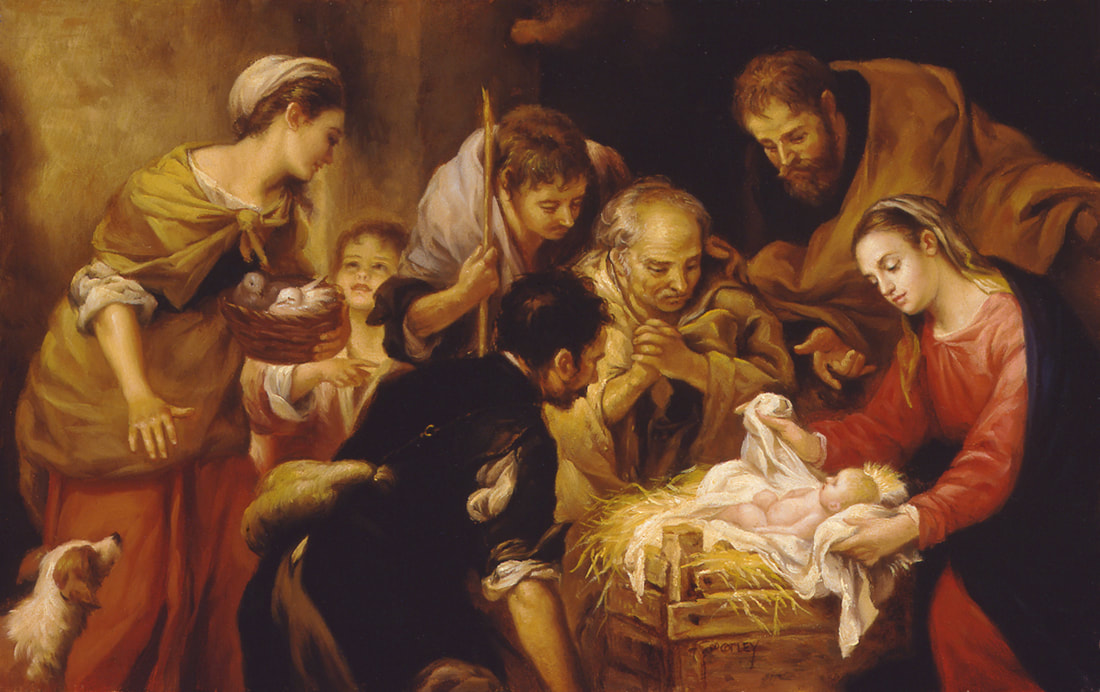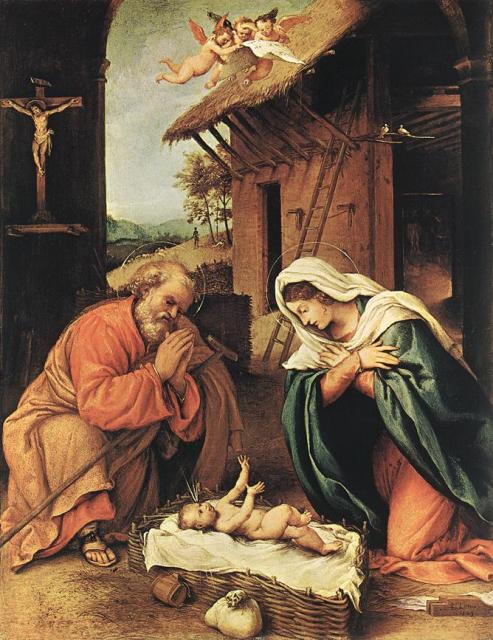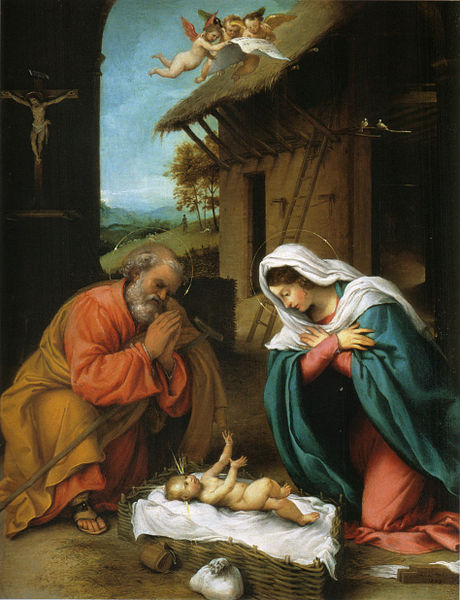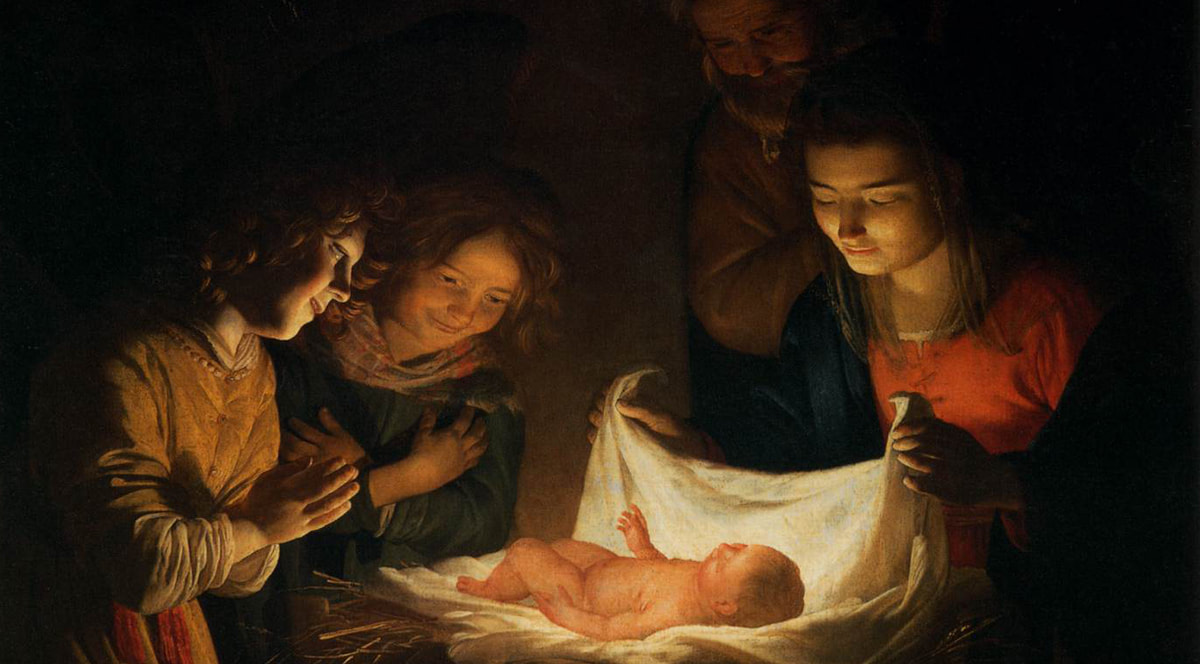John 1:1-14
Pastor James Preus
Trinity Lutheran Church
The Christmas story we are all familiar with comes from the Gospels of Matthew and Luke. Matthew and Luke detail the nativity of Christ with remarkable care, both in the events as they happened as well as the theological significance of them. Matthew records the angel telling Joseph that the baby will be called Jesus, because He will save His people from their sins and that He was conceived by the Holy Spirit, fulfilling the prophecy of Isaiah, that the virgin shall conceive and bear a son, and call his name Emmanuel, which means, God with us (Matthew 1:20-23). So, it is clear from Matthew that this child is both God and man, and that He is born to save us from our sins. Luke also records the virgin birth, the angel announcing to Mary that the child to be born to her would be the Son of the Most High, and the angels telling the shepherds that the baby was their Savior and Lord (Luke 1:35; 2:11). Matthew and Luke make clear the true meaning of Christmas: God became a man to save sinners from their sins.
Yet, those dwelling in darkness find a way to miss the point. Ancient heretics have denied the divinity of Christ and his saving work. And today, you can spend days listening to Christmas music, reading Christmas books, and watching Christmas movies, and never hear one mention of the Christ child, who He is and what He has done to save us. So, acutely aware of this, John writes His own Christmas account, and he peels back all the trappings, the angels, the shepherds, the charming town of Bethlehem, the manger and swaddling clothes, even Mary and Joseph. He lets us see under the hood, so to speak, so that we can recognize what is really going on without any distractions.
“In the beginning was the Word, and the Word was with God and the Word was God. He was in the beginning with God.” Not in the beginning the Word became. No, in the beginning the Word was. Which means that He is from before the beginning. The Word is eternal. This Word was with God, and God was the Word! Why does He say that the Word was with God, and that the Word was God? I don’t say that I am with myself! Because John is teaching us the doctrine of the Holy Trinity. The Word is with God means that He is a distinct person from the Father. The Word was God means that the Word shares one substance with the Father, so that there is only one God, although three Persons.
This is the doctrine taught throughout all of Scripture. The angel of the Lord is the Lord (Exodus 3). Why then is He called the angel of the Lord? Angel means messenger. Messengers speak. The angel of the Lord is the Word, who is with God, and He is God. We see the same thing with the Holy Spirit. He is called the Spirit of God, but then He is called God (Psalm 139; Isaiah 61:1). Scripture teaches three distinct Persons, Father, Son, and Holy Spirit, yet one, indivisible God.
John goes on to say that all things are made through Him and without Him nothing was made that was made. The founder of the Jehovah Witnesses did not know Greek, yet he claimed that all translations of the Bible were in error. He translated the previous passage, “And the Word was God,” to say, “And the Word was a God,” because they deny that Jesus is God. Yet, even if we let that bad translation stand, here it makes clear that Jesus is the one and only God. “All things were made through Him and without Him nothing was made that was made.” If everything was made through Christ and nothing was made without Him that was made, that means that Christ was not made! There is only one uncreated One, and that is God! So, John makes clear that the cute little baby lying in the manger is God Himself, the Creator of the heavens and the earth!
And He has come to shine light on those who dwell in darkness. This light, which Christ shines in the darkness is grace and truth, which grants life to all people. The grace is the free gift of God, that He desires to save all people, that He has promised to send His Son to bear our iniquities and grant us eternal life through His blood. The truth is that there is only one God, who has created the world. This God forgives our sins for Christ’s sake. Whoever receives this light, this grace and truth, receives everlasting life.
Those who dwell in darkness dwell in unbelief, sin, and in the shadow of death. They are too proud to receive God’s grace. They think they have the light of man, because they think they have reason, but their reason is tainted with sin. Those who dwell in darkness are doomed to die. Yet, when the light shines in the darkness, the darkness refuses to comprehend it. When Christ comes to His own, whom He created, His own creation refuses to receive Him. Jesus explains why this is in John chapter 3, “The light has come into the world, and the people loved the darkness rather than the light because their works were evil.” (3:19) Those who dwell in darkness do not want their wicked works to be exposed by the light. Those who live under a lie do not want the truth to expose their lie. Those who live in sin do not want righteousness to expose their sin.
And so, those who dwell in darkness cling to their unbelief. And so, we need another Christmas miracle. Not only do we need God to be born a man, so that He might save us. We need to be born of God, so that the will of flesh and blood and men cannot keep us from believing in Christ.
St. John tells us that those who receive the light of Christ in all His truth and grace are those who are born of God. How are they born of God? St. Paul tells us, “He saved us, not because of works done by us in righteousness, but according to His own mercy, through the washing of regeneration (literally, the act of being born again!), and the renewal of the Holy Spirit, whom He poured out on us richly, through Jesus Christ our Savior, so that having been justified by His grace, we might become heirs, having the hope of eternal life.” (Titus 3:4-7) This washing of new birth happens in Baptism, which Jesus Himself taught Nicodemus, when He said, “Truly, truly, I say to you, unless one is born again, he cannot see the kingdom of God,” and again, “Truly, truly, I say to you, unless one is born of water and the Spirit, he cannot enter the kingdom of God.”
Now, could God accomplish this new birth outside of Baptism? Sure. And He has, especially before He instituted Baptism. But Baptism is the way God has revealed that He will bring about new birth, so we should not despise it, but trust in His promise. Yet, it is always through the Word that God accomplishes rebirth, because faith always comes through hearing the Word of Christ (Romans 10:17).
This is how the light shines in us. The light shines in the Gospel, which proclaims God’s grace and truth in Jesus Christ. Those who dwell in darkness will resist this light. But the Holy Spirit has the power to bring those dwelling in darkness into the light, so that they themselves reflect the light of Christ. “The light has come into the world, and the people loved the darkness rather than the light because their works were evil.” (3:19) And so, we should desire that the light would give us the desire and ability to do what is right even as much as we desire the light to forgive our sins! And it is through receiving the forgiveness of sins that we gain the power to resist the darkness and desire the light.
“And the Word became flesh and dwelt among us.” You might have heard some pastors say, “and tabernacled among us.” That sounds funny, because we normally don’t use tabernacle as a verb. But the word for dwelt comes from the word for tabernacle. That is why our Old Testament lesson was Moses constructing the tabernacle. A tabernacle is a tent. God dwelt with his people in a tent where sacrifices were offered. It moved around, needed to be replaced. Sometimes they lost the ark. Finally, after about five-hundred years, they built a temple for God to dwell in and to offer sacrifices to replace the tabernacle. That worked pretty well. Except sometimes they would have wicked kings who would steal from the temple or put an end to sacrifices. Finally, after about four-hundred years, in 587 BC, King Nebuchadnezzar of Babylon destroyed the temple. It was rebuilt in 516 BC. Yet, again, wicked tyrants put an end to sacrifices for a time and finally the Romans destroyed it in 70 AD.
Yet, now God dwells in a tabernacle that will last, a tabernacle that is greater than the temple. Jesus Christ is the dwelling place of God. And He will always dwell as God. The sacrifices of this tabernacle cannot be taken away, rather, Christ in human flesh, offered a sacrifice to God, which completes all sacrifices. Now, we have an endless supply of food from His altar to sustain us in this life. The tabernacle in the wilderness is no more. The temple is no more. But Jesus Christ remains forever. He will continue to abide with us here on earth, proclaiming His Word and feeding us His body and blood. And finally, we will see Him face to face. He will dwell with us forever as our Brother. We will dwell in His light. And the darkness with its sin, doubt, and death, will be gone forever.
The world may hold
Her wealth and gold;
But thou, my heart, keep Christ as thy true Treasure.
To Him hold fast
Until at last
A crown be thine and honor in full measure. Amen.




 RSS Feed
RSS Feed